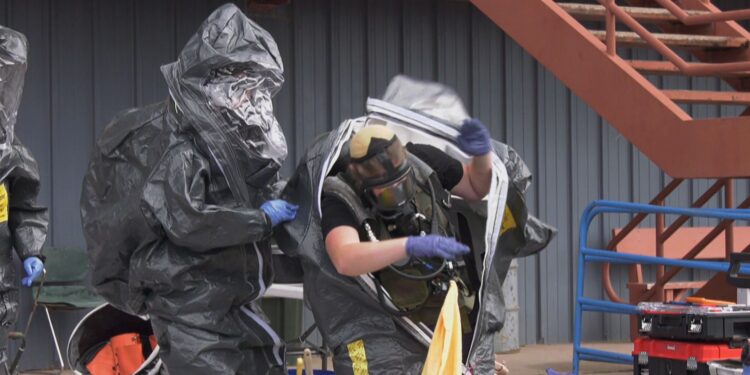ESCANABA, Mich. (WZMQ) – This week, a branch of the Michigan National Guard is conducting training exercises at the U.P. State Fairgrounds.
The 51st Weapons of Mass Destruction Civil Support Team identifies, advises, and assists local law enforcement agencies facing complex chemical, biological, radiological, and nuclear threats. Civil Support Teams are capable of a response time of under 90 minutes.
“We’re an Army National Guard unit based out of Fort Custer in Battle Creek,” said Support Team Captain Chris Pawsat. “We’re a joint unit, so we have Air Force members along with Army members on our team. We react to incidents within the state of Michigan, but then we also react to incidents all around the country.”
On Wednesday, the team responded to a simulated lab set up inside the grandstand. They sampled the substances inside, then went through a decontamination process to keep any “hazardous materials” contained.
According to Captain Pawsat, the entire exercise—just like a real-life scenario—brings multiple agencies together to coordinate a response.
“We get called in by the Department of Homeland Security and then work with the emergency managers here from Delta County and also Iron County and surrounding counties,” he explained. “In addition to that, we have the Weather Service on ground helping us with weather modeling so we can advise those local authorities on the plume model in case there is any off-gassing of a hazardous substance within this location.”
Another component of the training is communications. Support Team members establish satellite, cellular, and long-range, high-frequency radio communications to create a platform agencies can use to connect.
“Our main capability is for interoperability with the incident commander,” said Sergeant 1st Class Chris Schlieger, who works in Information Assistance Communications. “We are able to crossband radio frequencies from whatever the civilian side has to our military radios to be able to communicate between the two.”
In a place like the Upper Peninsula, Sergeant Schlieger says those services are especially crucial.
“When cell networks go down, we’ll be able to provide that to a scene,” he said. “Up here in the U.P., there’s a lot of ice storms. Cell service goes down a lot, so that capability is huge for the people up here to be able to continue their mission.”
Captain Pawsat says by training in Escanaba, the Civil Support Team is establishing a greater presence and strengthening its connections in the Upper Peninsula.
“We often think about all engagements and wartime overseas, but it can happen here at home,” he said. “We want to make sure we’re here on ground training with those authorities to show our support to different entities, including Marquette County, here in Delta County, and local and federal authorities around here.”
The Civil Support Team will conclude its Escanaba training on Thursday, September 11.

















